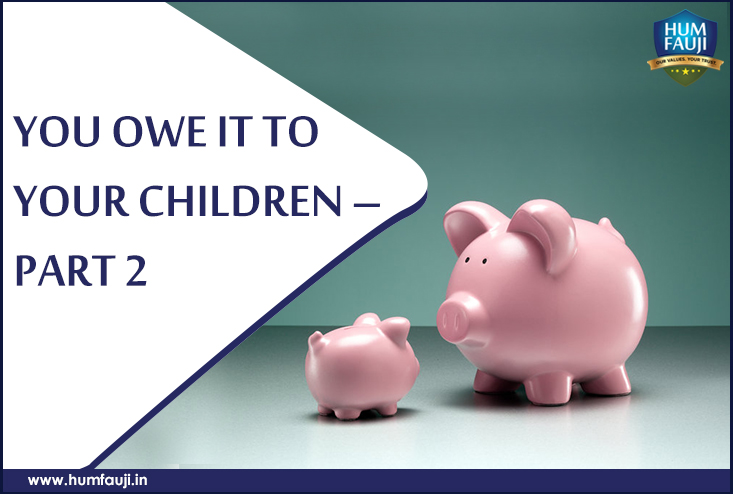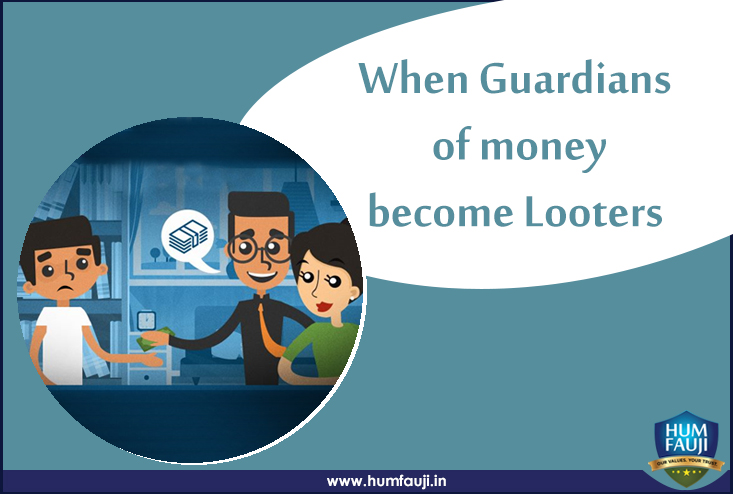“Sir, Can I speak to you regarding my retirement planning as I’m retiring six months from now?”
“Yes please. We can talk right now.”
“Sir, Can I know whether to commute my pension or not, and if yes, how much?”
This is how my typical conversation with somebody who’s retiring goes. Somewhere, the most urgent issue confronting a retiring armed forces officers now seems to be commutation!
In fact, I’m a big culprit myself contributing to this – commutation was a non-issue many years back and nobody used to talk much about it except those who used to look at their retiring papers made by the office clerk too closely. About 5 years back, I wrote an article on commutation of pension and all the hell broke loose. Commutation of pension became a serially trending subject with those nearing retirement. So much so that I was asked this very question by a Major rank officer while giving a financial planning lecture at DSSC, Wellington!
I have written on this subject a few times in the past (available on our blog at https://humfauji.in/blog/) but circumstances change and hence a revisit to the subject is required.
Before anything, let’s see a few facts about commutation of pension
- In commutation, you take a percentage of your future 15 years’ pension today. The Govt puts a rate of interest on it and a fixed amount is deducted every month from your pension, exactly like the EMI of a loan. Full Pension is restored exactly 15 years after the first commuted pension is received by you.
- Only Basic Pension gets commuted, never the DA. Thus, after commutation also, the DA is received on full Basic Pension. ‘Basic Pension’ is exactly half of your last drawn Basic Salary, ie, Basic + MSP + Rank Pay.
- Commutation can be done of any value from 0% to 50%.
- Commutation is calculated based on a ‘factor of commutation’ set by the Government which depends on the years of service done. This factor table is easily available on the net.
- Commutation percentage started or increased within one year of retirement but commutation percentage already done cannot be decreased.
Are there any advantages of commutation of pension?
- Pension is fully taxable, like the pay while in service, while the commuted bulk amount received is fully tax-free. Please note that complete pension is anyway tax-free for gallantry award winners and disability pension earners.
- If the pensioner passes away anytime, the family will get the same pension irrespective of commutation and the commuted amount received is not to be returned back to the Govt. Thus, non-commutation in such cases could be seen as a financial loss to the family.
- There would be a bulk amount available in hand which could be a big asset to deal with emergencies, financial goals and responsibilities or simply to lead a much better lifestyle.
- With prudent investing without taking any or small risks with a small part of your commuted amount, you can have the same amount of pension – or more or less, as per your requirement – vis-à-vis non-commutation while having a large amount available with you throughout your life.
- Since commutation is a one-time exercise, the commuted amount deduction per month remains static. So, while the pension rises continuously due to DA, pay commissions and now OROP, the commuted amount deduction is continuously reducing to be a smaller proportion of the pension. Eg, when I took my PMR in April 2010, my 50% commuted amount of Rs 15,805 per month was a big proportion of then pension. But now it is its small proportion and doesn’t bother me any bit.
Please remember that, post-commutation, the take home pension will reduce to the extent of the commutation done. However, our experience of talking to a large number of retired officers is that, for a husband and wife living in their own house in a metro city like Delhi, the regular monthly expenses, including everything, is about Rs 60-70,000 per month. Of course, this does not include EMI payments of loans, any house rent payable etc.
Now to the most important question – should you commute or not commute?
Anybody who reads the previous section would be tempted to commute, and commute to the maximum. This is so because it only conveys the mathematical side of commutation of pension. But life is much more than mere calculations.
My take on life-cases who should commute and how much, based more on living life to the best while fulfilling parental and other responsibilities is as follows:-
- Major Responsibilities pending still after retirement: The responsibilities could be children’s higher education, marriages, purchase or big renovation of house pending, large uncomfortable loan – typically a home loan, etc. Always better to commute probably to the maximum allowed extent of 50%. Would need to keep own monthly expenses in check so that the pension reduced due to commutation still suffices.
- Major responsibilities but also have a good alternate source of monthly income: If one has some major responsibilities pending but also has a good alternate source of income like rent, agriculture income, spouse income etc, then commutation should definitely be done to the maximum extent.
- Small responsibilities pending but expenses likely to be high: It will depend on the responsibilities pending like a child’s marriage, some renovation of house, purchase of a car, some contribution to child’s higher education, etc. So, commutation may be done but not to the extent of 50%; 25-30% commutation may be fine. If it is discovered later that more bulk amount is required due to needs while pension will still suffice, more commutation can always be done within next one year.
- No major expenses but young children or high monthly expenses due to lifestyle or responsibilities: Better not to commute or commute very less. But also think about the bulk requirement for children when they grow up and major amounts would be required for their education and marriages.
- Going in for Re-employment or a stable corporate job: Both the scenarios would lead to a good take-home money after retirement. When one gets back to full retirement 4-6 years later, the pension DA would also have increased, typically by 4-5% per year, thus increasing in-hand money then. Taking this into account, for most of the officers, commutation should be done to the extent feasible, closer to maximum commutation if possible.
- No major responsibilities, no high expenses, or enough income even after retirement to meet high expenses: This is a very comfortable situation and you are in a sweet spot. You may or may not commute as per your wish. Here we fall back to the mathematical part of commutation – there’s no point in not commuting, pay a tax and then invest the surplus amount. Hence, commute 50% if you’re fine with it. Even if you don’t commute, you would be fine, or maybe go half-way and commute some.
I hope I have been able to cover most of the scenarios that officers face and there is some amount of clarity. In case of any further queries, please put your queries on https://humfauji.in/contact-us/ and we’ll revert to you.
Just a couple of more things I would like to convey:-
- Before you rush to pre-pay an existing loan from your retirement corpus, do pause a bit to look at your future big money requirements coming up. We find closing of loans, which have otherwise continued for years, become a sudden urgency for many officers without considering their own life ahead as also the upcoming responsibilities. Do some calculations before taking a step either way. In case of doubt, consult a financial advisor.
- Most officers think that their monthly expenses will dramatically increase in the civil life after retirement. Nothing like this will actually happen. After the initial few months, the expenses will stabilise and come to almost the same level as while in service – some expenses of service time will go away while some new ones will come in. Total will remain more-or-less the same since lifestyles of a family have stabilised by the time one retires.
- If your expenses are comfortable Vs the earnings, plan to do more commutation. There is no point in having a large amount of money earning, paying tax on it and then investing. If you plan your investments properly, your taxes can actually do down substantially through tax-efficient returns from investments.
- Our take is that, after discharging responsibilities and major expenses, one should have at least Rs 50 Lakhs in hand remaining in bulk for self and wife – actually, 75 Lakhs is a more comfortable figure – to fulfil own personal aspirations, dreams and have a sense of financial security for the rest of the life.
Contributed by Col Sanjeev Govila (retd), CEO, Hum Fauji Initiatives














Leave a Reply